ROBERT WILLIAMS BUCHANAN (1841 - 1901)
|
ROBERT WILLIAMS BUCHANAN (1841 - 1901) |
|
|
|
|
|
|
|
|
ROBERT BUCHANAN SNR. |
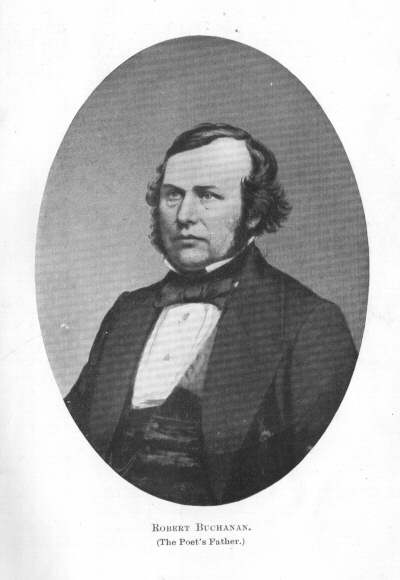 |
|||
|
ROBERT BUCHANAN SNR.
I should apologise for the rather random nature of this page. It would take another website, and time I don’t have, to do full justice to Robert Williams Buchanan’s father - the Socialist missionary, follower of Robert Owen, lecturer, poet, journalist and newspaper proprietor: Robert Buchanan.
Robert Buchanan Snr.’s entry in The Dictionary of National Biography, 1886. Buchanan, Robert (1813–1866), socialist, was born at Ayr in 1813. He was successively a schoolmaster, a lecturer advocating the socialistic views of Robert Owen, and a journalist. Manchester was an important centre of Owenism, and Buchanan settled in that town, where his small books were published. These are: 1. ‘The Religion of the Past and Present Society, founded upon a false fundamental principle inimical to the extension of real knowledge opposed to human happiness,’ Manchester, 1839. 2. ‘The Origin and Nature of Ghosts, Demons, and Spectral Illusions generally, fully and familiarly explained and illustrated,’ Manchester, 1840; this is a sensible pamphlet, in which some of the commoner causes of hallucination are exposed. 3. ‘An Exposure of the Falsehoods, Calumnies, and Misrepresentations of a Pamphlet entitled “The Abominations of Socialism Exposed,” being a refutation of the charges and statements of the Rev. Joseph Barker,’ Manchester, 1840; this went through two editions. 4. ‘Concise History of Modern Priestcraft, from the time of Henry VIII until the present period,’ Manchester, 1840; this is a bitter attack on the church of England. A chapter is devoted to the ‘persecution of the socialists,’ and another sets forth the ‘crimes of the clergy.’ 5. ‘The Past, the Present, and the Future,’ Manchester, 1840. In the preface to this work the author disclaims ‘pretensions to the character of poet,’ but adopts blank verse, from a strong natural love of poetry and a belief in its superiority as a vehicle for instruction. ‘The object of the writer is .. to contrast the evils of the old world with advantages of the new moral world of Robert Owen.’ 6. ‘Socialism Vindicated’ is a reply to a sermon preached by the Rev. W. J. Kidd, Manchester, 1840. Mr. Kidd was the rector of St. Matthew's, which was opposite to the ‘Hall of Science’ built by the Owenites in 1839. The socialists were prosecuted for having lectures on Sunday and charging for admission, contrary to the statute of Geo. III, c. 79. They were prepared to show that the ‘collection’ had been a voluntary one, but as their witnesses declined to take the oath there was no legal defence, and they were fined. The building was registered as the meeting- house of a society of dissenters by the name of ‘Rational Religionists.’ Mr. Kidd, aided by Mr. T. P. Bunting, the son of the well-known Wesleyan minister, the Rev. Jabez Bunting, induced the stipendiary magistrate to tender to Buchanan the oaths which by statute were required from dissenting ministers. Mr. Bunting then managed to elicit from him a declaration that he did not believe in the orthodox doctrines of damnation. This was a fatal objection, and after several adjournments Buchanan was fined 50s. for refusing to take the oaths of supremacy, &c. After the decline of Owenism, Buchanan, who was a contributor to the ‘Northern Star,’ the organ of the chartist movement, but never joined its physical force section, removed to Glasgow, where he became editor of a newspaper, and there was born, on 6 Aug. 1841, his son Robert, who attained distinction as poet and dramatist, and died 10 June 1901. Buchanan died at this son's house at Bexhill, Sussex, 4 March 1866. [Sutton's List of Lancashire Authors; information supplied by Mr. Abel Heywood, J.P., Manchester; Manchester Guardian, June and July 1840.] ___
From The Poetry and the Politics: Radical Reform in Victorian England by James Gregory (London, New York: I. B. Tauris & Co., p.236): Robert Buchanan, the Ayrshire-born journeyman tailor, Owenite socialist missionary and aspiring poet (indeed Holyoake recalled him as ‘addicted to poetry, in which he succeeded better than any of the competitors in verse by whom he was surrounded’) who had briefly been editor of the Morning Star with Duncan, under what circumstances we will never know, helped establish one short-lived ultra-reform news paper in London, The Spirit of the Age, in 1848, joined a League of Social Progress with other prominent Owenites, and edited the Weekly Tribune. Settling in Glasgow he became proprietor and editor of the leading radical and freethinking working-class weekly Glasgow Sentinel, in October 1850. Compared with the Morning Star’s miniscule circulation, Buchanan was now associated with a paper which claimed an average ‘weekly circulation of six thousand copies . . . thus at once took the first place among Scottish Journals which it has ever since maintained’. This ‘self-made man of the very highest class’, according to The Athenaeum, had risen to become ‘a leader in politics and sociology’, supporting further parliamentary reform in the late 1850s. Although bankrupted and forced to sell the printing and publishing premises and plant, and the copyright of the Sentinel, Glasgow Times, Penny Post in July 1860 he announced the Industrial News, A Journal of Trades’ Organisations, Co-operative Enterprise, and the Rights of Labour in May 1862. He died at his son’s house in Sussex in March 1866. This son, the more famous and talented poet, Robert W. Buchanan, had issued his first volume of poetry, Poems and Love Lyrics, at sixteen. ___
Robert Buchanan Snr.’s Works Of the six works listed in the D. N .B., only one is freely available online. 1. The Religion of Past and Present Society Founded Upon a False Fundamental Principle Inimical to the Extension of Real Knowledge, Opposed to Human Happiness: A Lecture Delivered in the Social Institution, Salford, March 10, 1839 (Manchester: A. Heywood, 1839, 23 pp.) 2. The Origin and Nature of Ghosts, Demons, and Spectral Illusions generally, fully and familiarly explained and illustrated (Manchester: A. Heywood, 1840, 64 pp.) |
|||
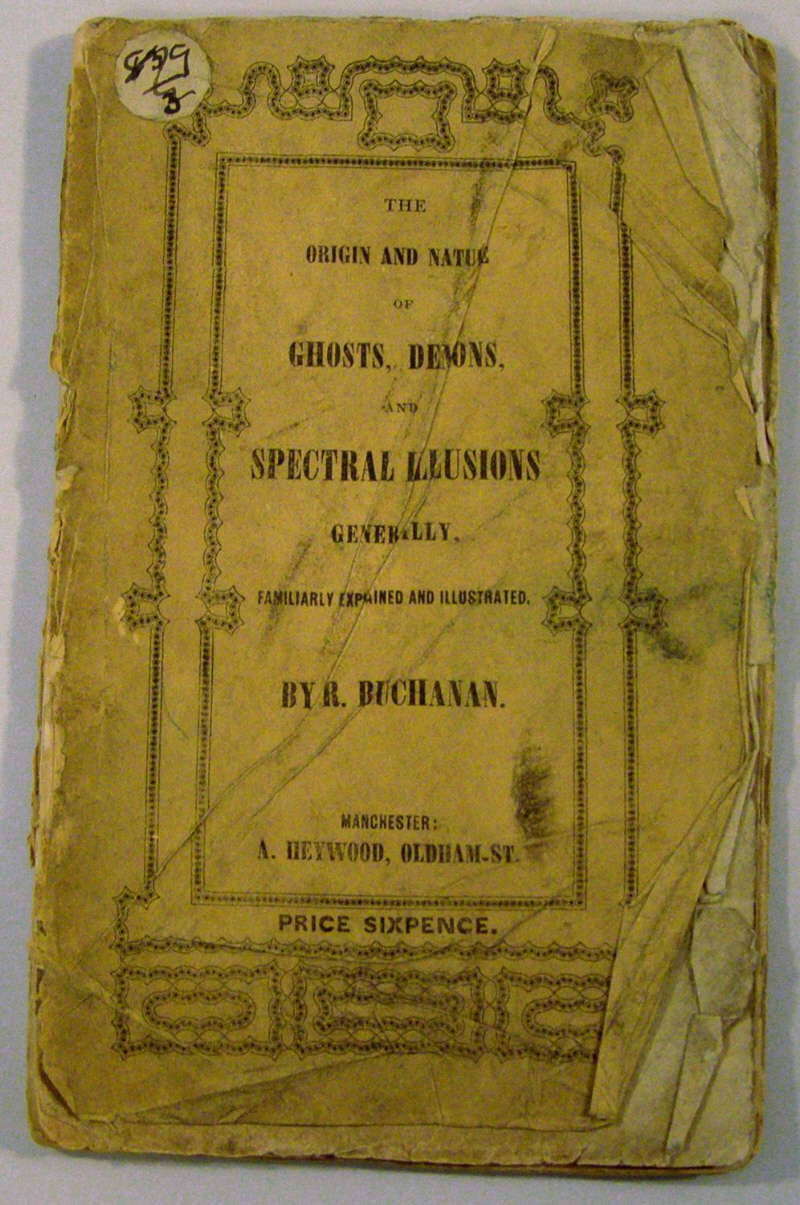 |
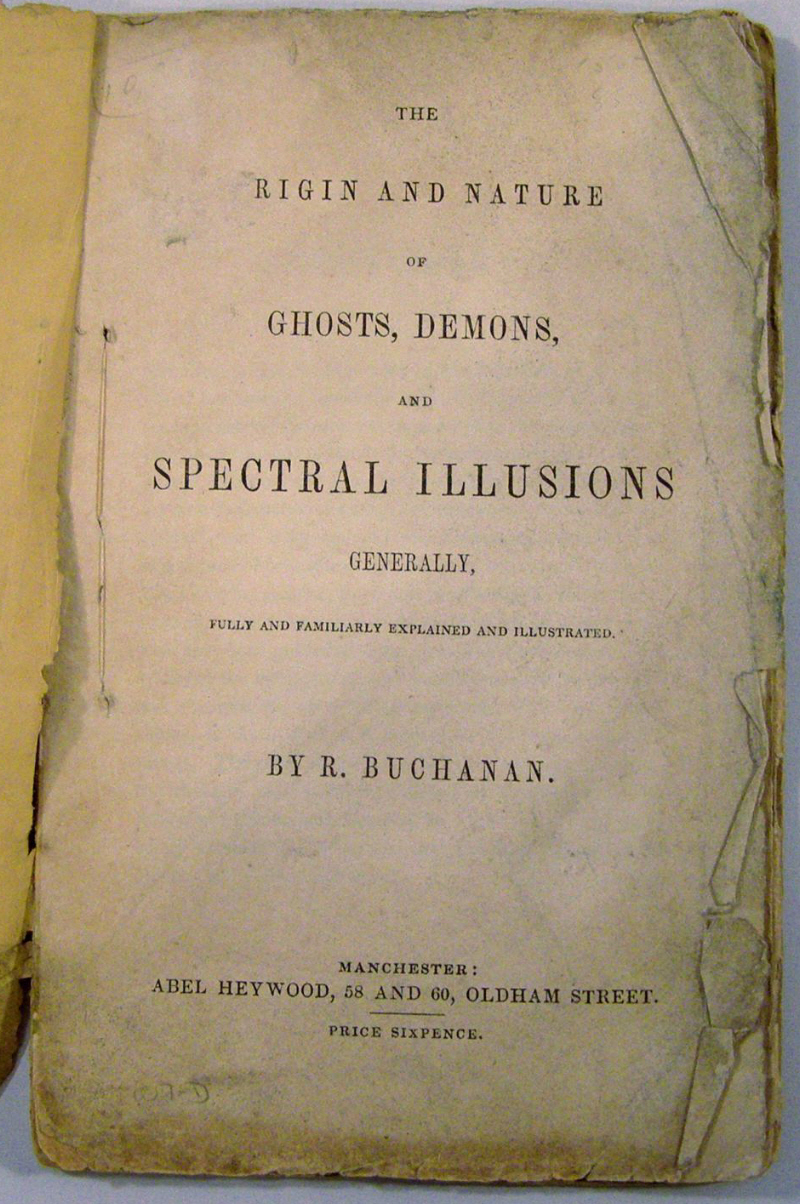 |
|
3. An Exposure of the Falsehoods, Calumnies, and Misrepresentations of a Pamphlet entitled “The Abominations of Socialism Exposed,” being a refutation of the charges and statements of the Rev. Joseph Barker, and All Others who Have Adopted a Similar Mode of Opposing Socialism (Manchester: A. Heywood, 1841 (2nd ed. 1880), 48 pp.) |
|||
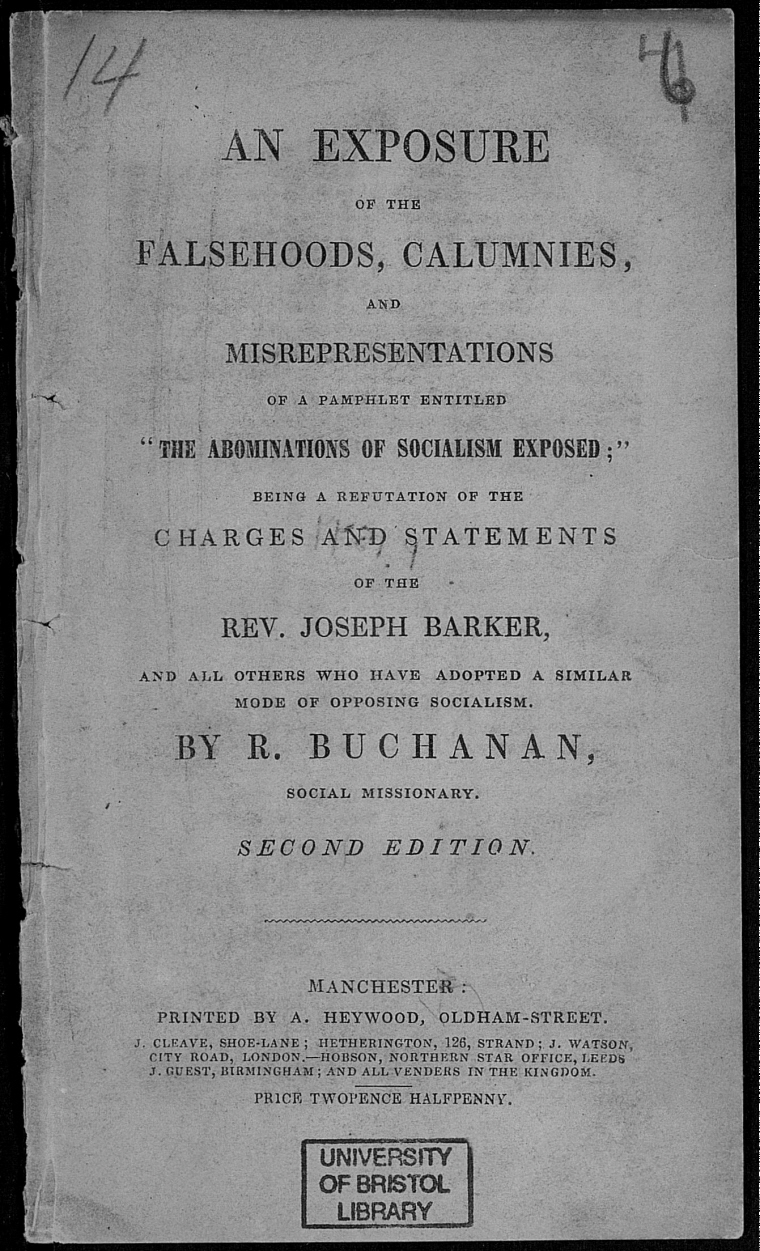 |
|||
|
4. A Concise History of Modern Priestcraft, from the Time of Henry VIII until the Present Period (Manchester: A. Heywood, 1840, 172 pp.) Available here. |
|||
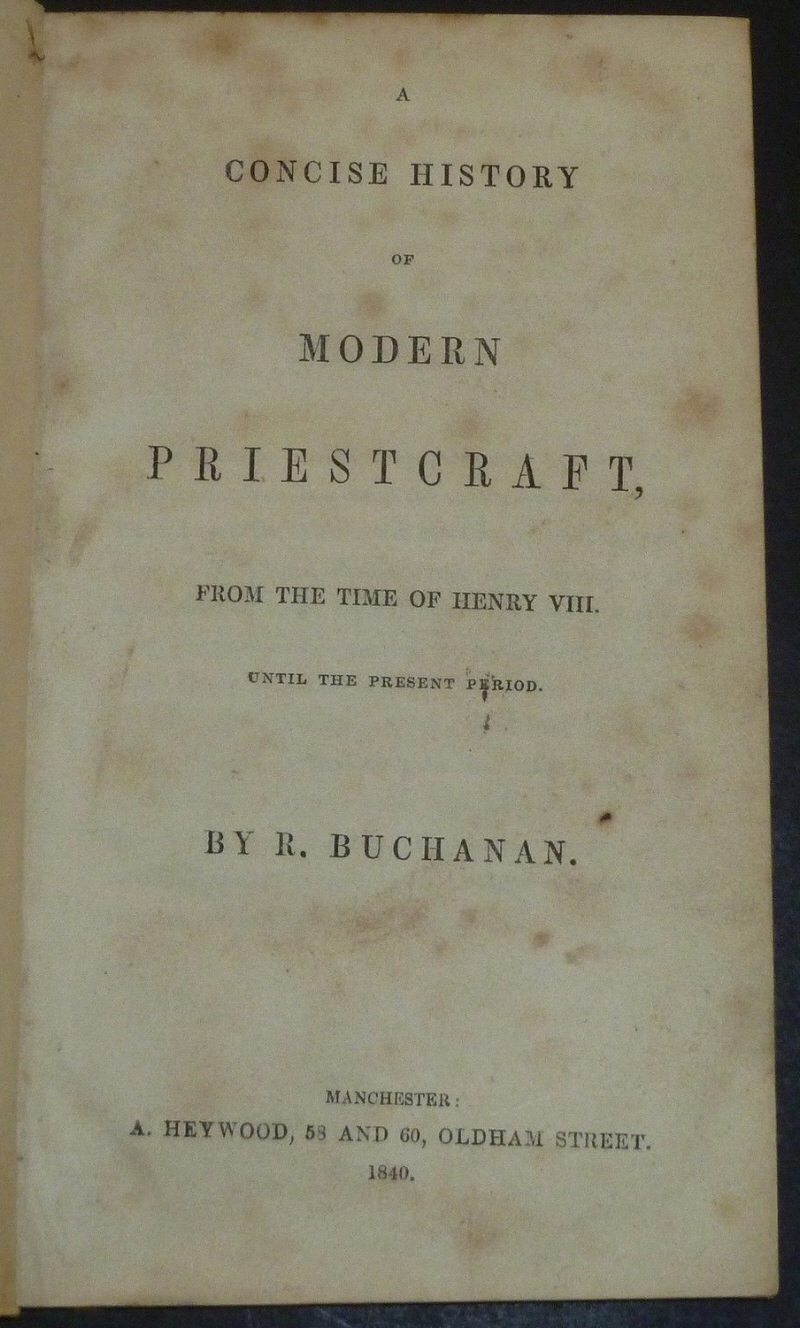 |
|
5. The Past, the Present, and the Future: a poem (Manchester: A. Heywood, 1840, 72 pp.) |
|||||||||||||||||||||||||
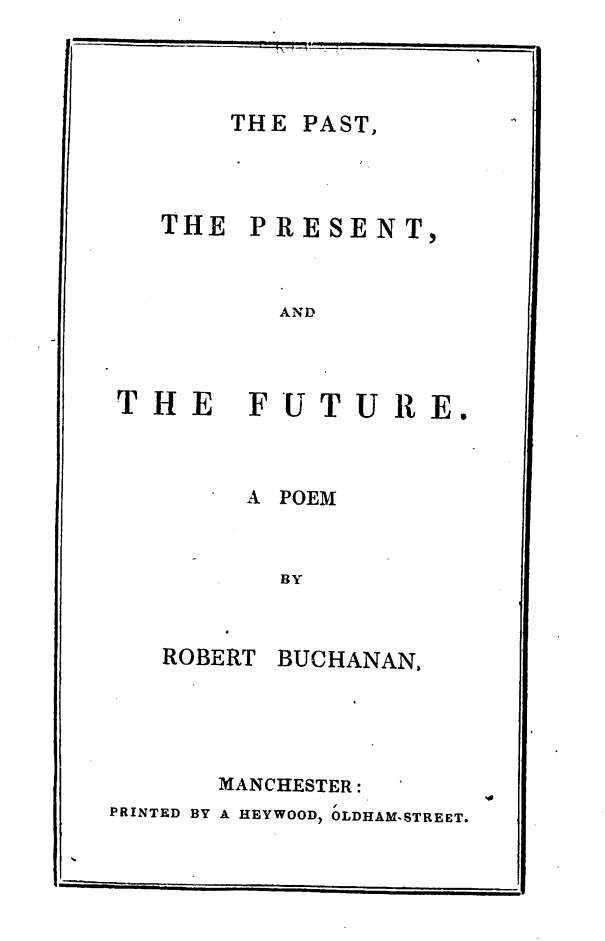 |
|||||||||||||||||||||||||
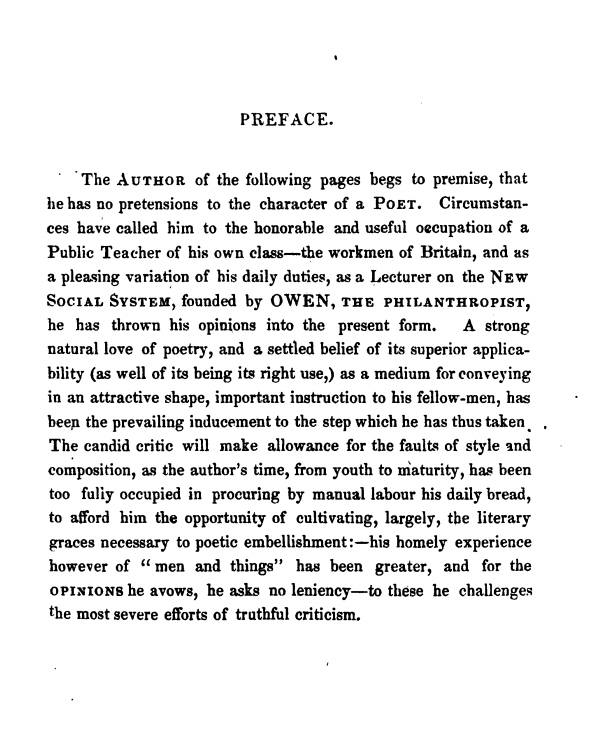 |
|||||||||||||||||||||||||
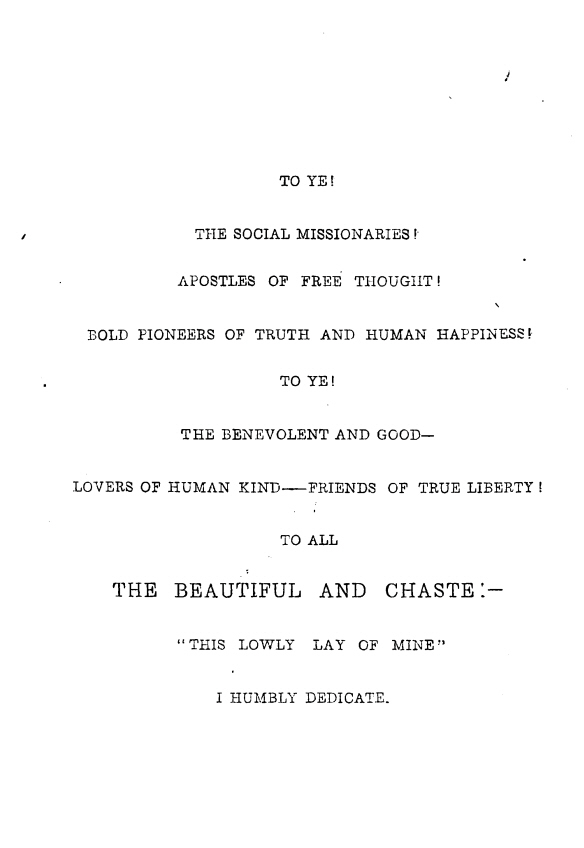 |
|||||||||||||||||||||||||
|
The poem was reviewed in The New Moral World. The New Moral World (25 April, 1840 - pp.1257-1260) |
|||||||||||||||||||||||||
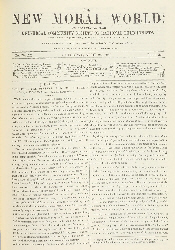 |
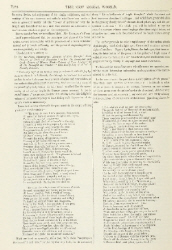 |
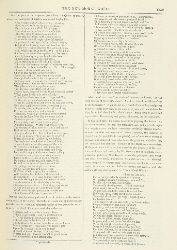 |
|||||||||||||||||||||||
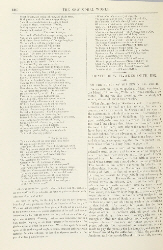 |
|||||||||||||||||||||||||
|
6. Socialism Vindicated: in reply to a sermon entitled “Socialism denounced as an outrage upon the laws of God and man,” preached by the Rev. W. J. Kidd, in St. Matthew’s Church, Camp Field, Manchester, on Sunday morning, July 12th, 1840 (Manchester: A. Heywood, 1840, 8 pp.) ___
Newspaper Cuttings The Northern Star (2 June, 1838) BLACK AND WHITE SLAVERY. BY ROBERT BUCHANAN.
Does Brougham’s master mind, strive to arrest ___
The New Moral World (10 August, 1839 - Vol. VI, p. 672) DUNDEE, AUGUST 1, 1839.—I have had my hands completely full this last fortnight, having lectured in Kilmarnock three times; in Paisley as often; besides holding forth in Johnstone, Barrhead, Kelbarchon, Greenock, and Glasgow. My reception and success in Kilmarnock was most flattering, being more decidedly favourable than in any new place I have ever lectured in. Though opposed by a gentleman on the practicability of the Social system the last evening, three-fourths, at least, of a large meeting, by their exhibition of feeling, gave unequivocal proofs of their aversion to competition, and their leaning to the side of co-operation. Mrs. Hamilton was also present, and made a rigmorole speech against Socialism, which very few present could know the meaning of, it was so incoherent. She had been lecturing there on Phrenology in connexion with Christianity and, what do you think, ANIMAL MAGNETISM!! Verily, this is an age of quacks and gulls. Her success, however, among the weavers of Kilmarnock, has been very small. In Paisley, I had an opponent in the person of the Rev. Mr. Kennedy, Methodist preacher, who confining himself principally to the asking of questions, by way of being extremely ignorant of the principles, though the ignorant gentleman had previously thought himself wise enough to lecture repeatedly on Infidel Socialism, and denounce Mr. Owen and his followers. The gentleman was extremely mild, and the audience very well satisfied with the answers given. ___
The Charter (3 November, 1839) |
|||||||||||||||||||||||||
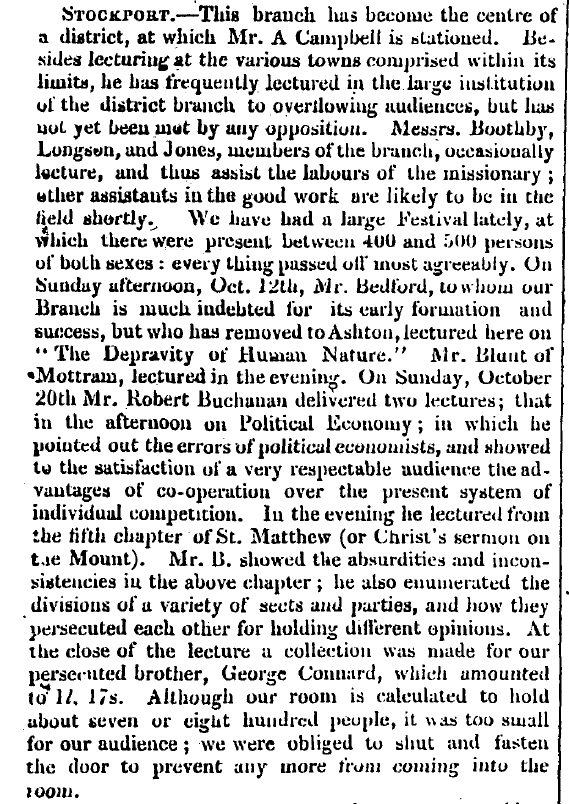 |
|||||||||||||||||||||||||
|
The following items relate to the court case mentioned in the D. N. B. article above, concerning the dispute with Rev. W. J. Kidd and the administering of oaths. The Guardian (27 June, 1840 - p.3) THE INFORMATION AGAINST THE SOCIALISTS.—On Wednesday morning, Mr. T. P. Bunting again attended at the Borough Court, and stated to the sitting magistrates, Daniel Maude, Esq. and C. J. S. Walker, Esq. that, in reference to the informations laid by the Rev. W. J. Kidd, of St. Matthew’s Church, against the three socialists, Messrs. Robert Owen, James Rigby, and Robert Buchanan, in which he had applied to the court the preceding day, he had since ascertained that the two former, Owen and Rigby, had quitted or did not reside in the district, and therefore it was useless for him to apply for summonses for them. He should therefore only apply for a summons against Robert Buchanan. The summons was granted, and we believe is returnable this day. ___
Manchester Courier and Lancashire General Advertiser (27 June, 1840 - p.6) FURTHER INFORMATIONS AGAINST THE SOCIALIST LECTURERS. |
|||||||||||||||||||||||||
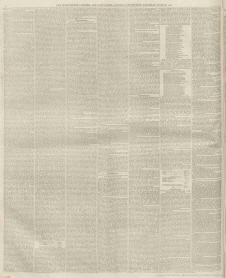 |
|||||||||||||||||||||||||
|
The Standard (2 July, 1840 - p.2) SOCIALISM UNMASKED.—DISBELIEF IN A MANCHESTER.—A most singular proceeding with respect to the socialist lecturers in this town took place before the magistrates at the Borough Court on Saturday last. To render the merits of the case properly understood, it is necessary to state that, about a fortnight since informations were preferred against Robert Owen and some other of the socialist leaders, for delivering lectures or discourses in a building called “the Hall of Science,” at the doors of which money was taken for admittance, the said building not being duly licensed under the 37 Geo. III. cap. 74. To meet this charge, the defendants gave evidence of “the Hall of Science” having been duly registered by the Bishop of the diocese, under the act 52 Geo. III., cap. 133, as “a place of worship for a body of Protestant Dissenters, calling themselves “Rational Religionists.” Notwithstanding this, conviction was obtained, in one case, the remainder being withdrawn. The Socialists having thus taken upon themselves the guise of Protestant Dissenters, while their proceedings were such as were calculated to bring the name itself into reproach, the Rev. Mr. Kidd, the incumbent of the district in which the “Hall” is situate (which stands within 100 yards of St. Matthew’s Church), felt it his duty to institute a further proceeding against these individuals, in order that they might not ingratiate themselves with the unwary, under the cloak of “Protestant Dissenters.” Accordingly, a complaint was lodged with the magistrates, setting forth the facts above stated, also that the doctrines taught at “the Hall of Science” were contrary to those of the Christian religion, one of their principles being that man was not responsible for his actions: and praying that Robert Owen and two others might be summoned and required to take and subscribe the oaths and declarations contained in the act, 19 Geo. III., entitled “an act for the further relief of Protestant Dissenting ministers and schoolmasters.” The magistrates having ascertained that Mr. Kidd had just cause of complaint, owing to the frequent distribution of Socialist tracts at the door of his church, granted summonses upon this complaint, requiring Owen and his coadjutors to appear and take the prescribed oaths, and make the declarations as “Protestant Dissenters,” the character they had taken upon themselves. ___
Manchester Courier and Lancashire General Advertiser (4 July, 1840 - p.6) SOCIALIST INFORMATION AGAINST THE VICTORIA GALLERY OF SCIENCE. [followed by] PROCEEDINGS AGAINST THE SOCIALISTS. |
|||||||||||||||||||||||||
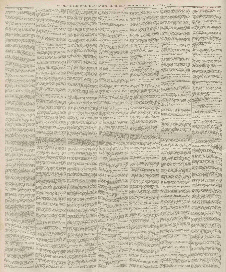 |
|||||||||||||||||||||||||
|
Manchester Courier and Lancashire General Advertiser (4 July, 1840 - p.5) |
|||||||||||||||||||||||||
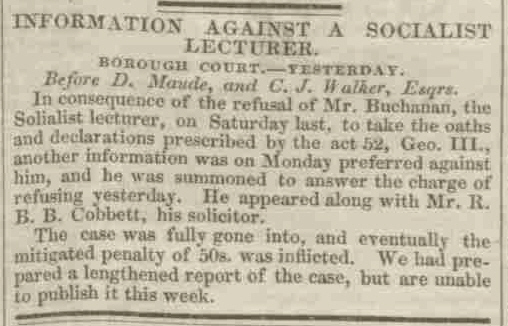 |
|||||||||||||||||||||||||
|
The Courier (8 July, 1840) HORRIBLE AVOWAL OF A SOCIALIST.—A man named Robert Buchanan, a “Socialist,” has been fined at Manchester in the mitigated penalty of 50l. for refusing to take the oaths and declarations contained in the Act of the 19th of George III., entitled “An Act for the further relief of Protestant Dissenting Ministers and Schoolmasters.” The Socialists received money at the Hall of Science, Manchester, where their lectures were given, and as the building had been registered in the Court of the Bishop of the diocese as a place of religious worship for a body of protestant Dissenters called “Rational Religionists,” the defendant was called upon to take the usual oaths administered to Protestant Dissenters. Before tendering the oaths the magistrates thought it necessary to inquire whether he believed in the sanctity of an oath, when he unblushingly avowed his disbelief in a future state. Of course this was tantamount to refusing the oaths, as well as the declaration, and he was proceeded against for the penalty incurred thereby, which ranges from 10l. to 100l., and, as we have already stated, the defendant was fined in a mitigated penalty, it having been proved that he had lectured in the building in question. ___
The Staffordshire Gazette (17 October, 1840 - p.3) |
|||||||||||||||||||||||||
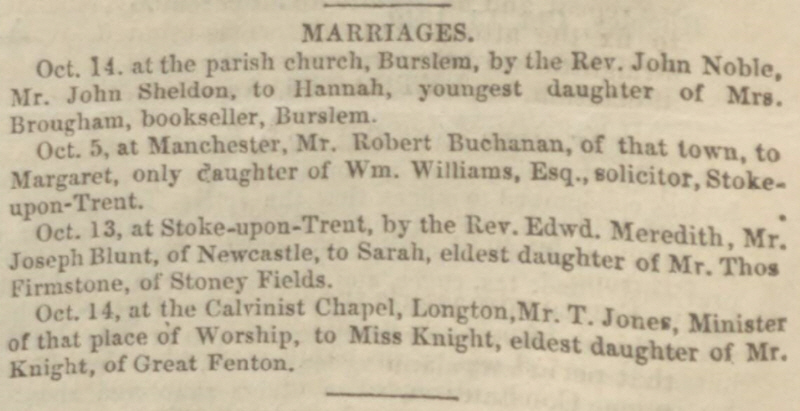 |
|
Robert Williams Buchanan was born in Caverswall on 18th August, 1841. According to the following report, his father was back in court in Manchester on that day. |
||||||
 |
||||||
|
On the 23rd August, 1841, Robert Buchanan Snr. was in Manchester discussing with Rev. J. R. Stephens “the truth and practicability of Socialism” at a public meeting held at the Hall of Science. The Northern Star (28 August, 1841) [Apologies for the quality of the scan.] |
||||||
 |
||||||
|
In 1841 Robert Buchanan Snr. had edited his own paper for a short time, in Manchester, The Rational Religionist and Independent Inquirer into Social and Political Economy, Religion, Science and Literature. After 1841, however, details of his life become scarce. According to his entry in the current D. N. B.: “A serious physical assault on Buchanan at a Methodist chapel in Whitehaven, Cumberland, in January 1842 brought his missionary career to a close.” The Buchanan family then moved to London, where Robert Buchanan Snr. worked as a journalist for The Sun and was the London correspondent for the Birmingham Pilot. He retained his links with the Owenites, and in November 1848 joined the board of the new League of Social Progress. In 1851 he moved back to Scotland, buying The Glasgow Sentinel (raising the money on a life insurance policy) on 18th April, 1851. In 1852 and 1854 he stood (unsuccessfully) as a candidate in the Glasgow municipal elections. A second child, Margaret Anne, was born on 24th March, 1853 but died seven weeks later on 11th May. Buchanan added the Penny Post, Glasgow Times and the Leeds Express to his newspaper ‘empire’ but in 1860 was declared bankrupt. Details of this period and his business practices are available in the Buchanan and the Law section of the site and there is also a section on The Glasgow Sentinel. After his bankruptcy, he and his wife returned to London. In 1864 he accompanied his son to Denmark to report on the Second Schleswig- Holstein War for The Morning Star. Robert Buchanan Snr. died on 4th March, 1866 at his son’s house in Bexhill; he was 54 years old. On 10th March, he was buried at St. Peter’s Church, Bexhill. ___
On 15th August, 2015, I visited the Church of St. Peter in Bexhill in search of the grave of Robert Buchanan, Socialist missionary, follower of Robert Owen, and dedicated atheist. I didn’t find it. The sea air had eroded the inscriptions on the majority of the old gravestones, so, if Robert Buchanan’s still stood, there was no way of discovering it. |
||||||
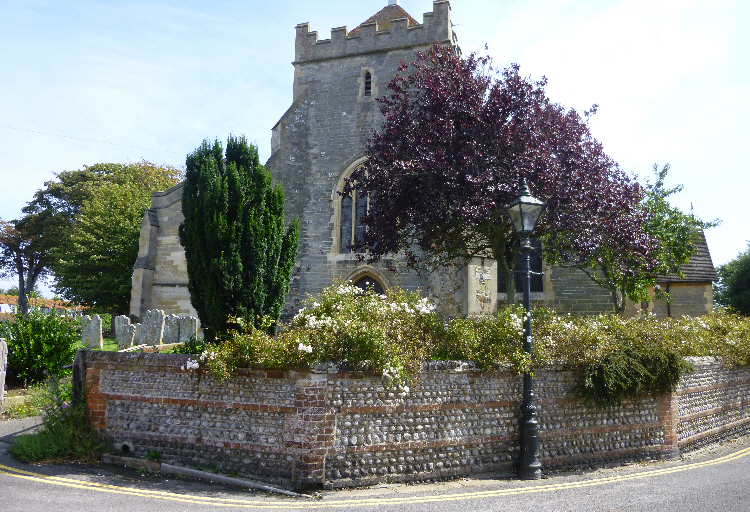 |
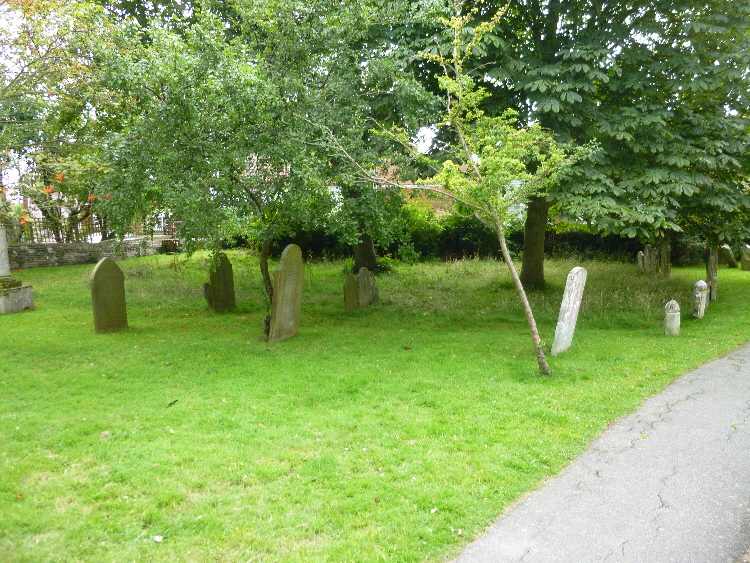 |
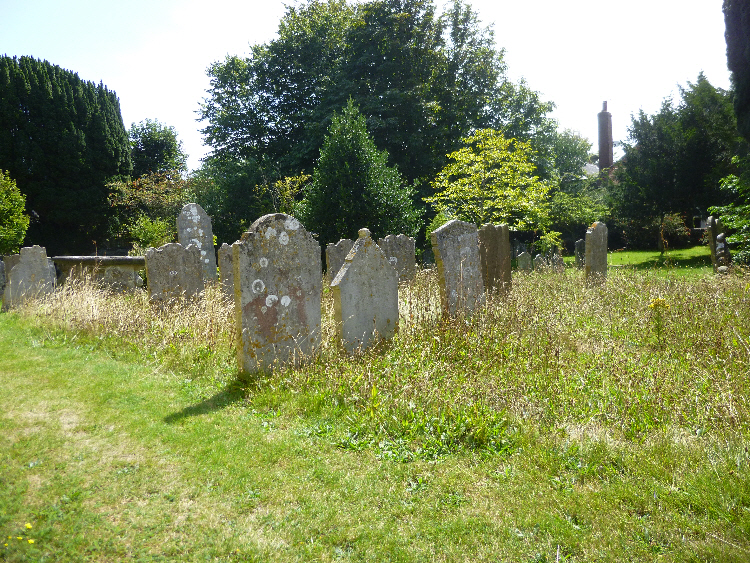 |
|
In October, 2020, I added another couple of pages to the site concerning the adventures of Robert Owen, Robert Buchanan Snr., and his father-in-law, William Williams, in the Potteries of the 1840s, which gives a bit more background to the Socialist struggle of those times. Plus ça change ... _____
Back to Timeline: 1. 1840-1868 or main menu.
|
|
|
|
|
|
|